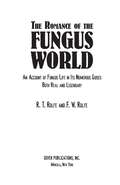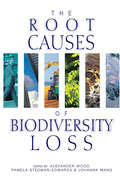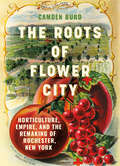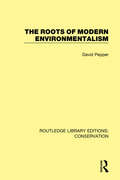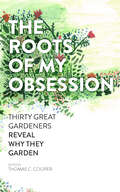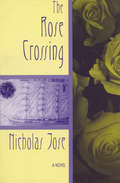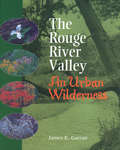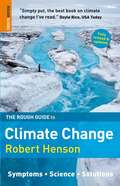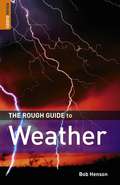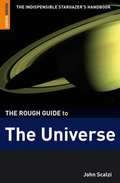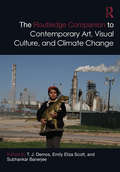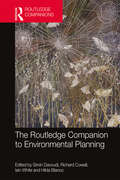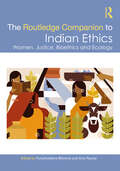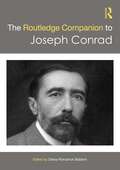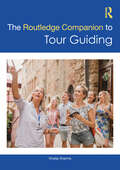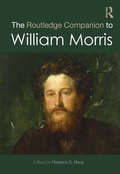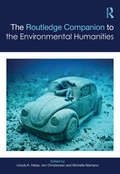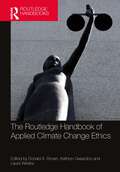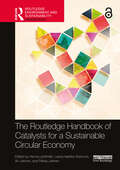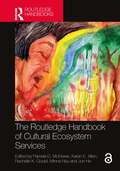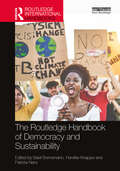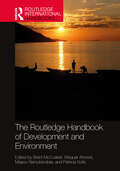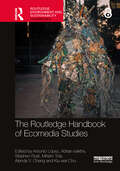- Table View
- List View
The Romance of the Fungus World: An Account of Fungus Life in Its Numerous Guises Both Real and Legendary
by R. T. RolfeMankind has always had a love-hate relationship with fungi. On the positive side, edible mushrooms and truffles are gastronomic delights, and certain fungi possess medicinal properties. On the other hand, many mushrooms are poisonous, and fungi can inflict costly damage on crops and other property. This captivating book explores both sides of the story, examining aspects usually overlooked in texts and field guides.The survey begins with fungi lore from mythology and legends, focusing particularly on the plants' association with devils, witches, and fairies. A balanced portrait of fungi in the real world considers not only the ruin caused by the plants but also their uses in medicine and industry and as foods. Ranging far and wide in its topics, the narrative offers a light touch and plenty of enthusiasm, making this book fun for everyone with even a casual interest in mushrooms. In addition, serious mushroom hunters will find this volume a practical reference and a fascinating resource for leisurely browsing.
The Root Causes of Biodiversity Loss
by Alexander Wood Pamela Stedman-Edwards Johanna MangThe world is losing species and biodiversity at an unprecedented rate. The causes go deep and the losses are driven by a complex array of social, economic, political and biological factors at different levels. Immediate causes such as over-harvesting, pollution and habitat change have been well studied, but the socioeconomic factors driving people to degrade their environment are less well understood. This book examines the underlying causes. It provides analyses of a range of case studies from Brazil, Cameroon, China, Danube River Basin, India, Mexico, Pakistan, Philippines, Tanzania and Vietnam, and integrates them into a new and interdisciplinary framework for understanding what is happening. From these results, the editors are able to derive policy conclusions and recommendations for operational and institutional approaches to address the root causes and reverse the current trends. It makes a contribution to the understanding of all those - from ecologists and conservationists to economists and policy makers - working on one of the major challenges we face.
The Roots of Flower City: Horticulture, Empire, and the Remaking of Rochester, New York
by Camden BurdIn The Roots of Flower City, Camden Burd explores the economic and ecological significance of Rochester plant nurserymen over the course of the nineteenth century. As the first boomtown in the United States, Rochester was an embodiment of nineteenth-century market economies and social reform movements. Connected to the eastern seaboard by the Erie Canal, the city's unique economic, cultural, and environmental conditions fostered and sustained a vast and influential commercial plant nursery industry that attracted the nation's most prominent horticulturists and nurserymen. Rochester-area nurserymen built parks and rural cemeteries, landscaped homes and schools, and promoted horticultural pursuits regionally and nationally. As their influence grew, many of these horticultural entrepreneurs developed into the city's elite and played a leading role in shaping Rochester's economic, social, and physical landscape. Most significantly, nurserymen enthusiastically participated in the American imperial project, selling and distributing fruit, shade, and ornamental trees, shrubs, and flowers across the continent, transforming landscapes and ecologies far beyond New York. The Roots of Flower City tells the remarkable history of Rochester's outsized influence on the homes, estates, towns, and cities of nineteenth-century America as it weathered economic downturns and competition from other regions. One threat, however, proved to be too much to overcome. As Burd details, the spread of the destructive San Jose scale through the transcontinental plant trade prompted federal legislation that would lead to the decline of the Rochester plant nursery industry in the last decade of the nineteenth century, ending a sustained era of success and ecological impact.
The Roots of Modern Environmentalism (Routledge Library Editions: Conservation #6)
by David PepperOriginally published in 1984, The Roots of Modern Environmentalism provides a historical, philosophical and ideological background to environmentalism. Topics covered include, the roots of technological environmentalism, the medieval cosmology and Bacon’s philosophy, the non-scientific roots of ecological environmentalism, such as Romanticism and its scientific roots in the theories of Malthus and Darwin. The Marxist perspective on Nature is also discussed. The concluding chapter is a criticism of education which challenges its usefulness as an agent of socio-economic change. This book will be of interest to academics and students of environmentalism and geography.
The Roots of My Obsession: Thirty Great Gardeners Reveal Why They Garden
by Thomas C. CooperWhy do you garden? For fun? Work? Food? The reasons to garden are as unique as the gardener.The Roots of My Obsession features thirty essays from the most vital voices in gardening, exploring the myriad motives and impulses that cause a person to become a gardener. For some, it’s the quest to achieve a personal vision of ultimate beauty; for others, it’s a mission to heal the earth, or to grow a perfect peach. The essays are as distinct as their authors, and yet each one is direct, engaging, and from the heart. For Doug Tallamy, a love of plants is rooted first in a love of animals: “animals with two legs (birds), four legs (box turtles, salamanders, and foxes), six legs (butterflies and beetles), eight legs (spiders), dozens of legs (centipedes), hundreds of legs (millipedes), and even animals with no legs (snakes and pollywogs).” For Rosalind Creasy, it’s “not the plant itself; it’s how you use it in the garden.” And for Sydney Eddison, the reason has changed throughout the years. Now, she “gardens for the moment.” As you read, you may find yourself nodding your head in agreement, or gasping in disbelief. What you’re sure to encounter is some of the best writing about the gardener’s soul ever to appear. For anyone who cherishes the miracle of bringing forth life from the soil, The Roots of My Obsession is essential inspiration.
The Rose Crossing: A Novel
by Nicholas Jose&“A fable, set in the 17th century, filled with vivid evocations of another time [and] wonderfully peculiar characters.&” —Kirkus Reviews To escape Puritan England, naturalist Edward Popple signs on to be a ship&’s doctor on a journey across the Indian Ocean, and his daughter, Rosamund, stows away to accompany him. But a wreck leaves them stranded on an island off the coast of Africa. Amid the lush vegetation, the birds and the sea turtles, father and daughter set about exploring, Edward passionately studying the island&’s horticulture and Rosamund wandering about to discover its mysteries. Then a Chinese ship, with the last heir to the Ming dynasty among its passengers, arrives—and changes everything. &“The prose is ripe, laden with a sense of the forbidden, and with doom.&” —Publishers Weekly &“A luminous historical novel.&” —Booklist Online
The Rouge River Valley: An Urban Wilderness
by James E. GarrattThe Rouge River Valley, eleven thousand acres of urban wilderness, is a unique, yet very fragile and transient natural phenomenon existing within the confines of a major North American city, Toronto. Fed by the Oak Ridges Moraine, the Rouge river system has, over generations of time, cut its identity into the land, shaping the habitat for a multitude of lifeforms, many of which are now either threatened or gone. Author James E. Garratt, a seasoned environmentalist, shares two decades of personal observation and ecological study to reveal the richness and flow of seasonal changes in this exceptional urban park. This "portrait" of a year in the Rouge Valley explores not only the diversity of life in its natural habitat but also the impact of urban sprawl and the inevitable conflict with development. Is it possible to be a true naturalist "grounded" in a modern city? The words of Ian McHarg, an urban planner, hold true: "We need nature as much in the city as in the country."
The Rough Guide to Climate Change
by Duncan Clark Robert HensonThe Rough Guide to Climate Change gives the complete picture of the single biggest issue facing the planet today. Cutting a swathe through scientific research and political debate, this completely updated 2nd edition lays out the facts and assesses the options- global and personal- for dealing with the threat of a warming world. The guide looks at the evolution of our atmosphere over the last 4.5 billion years and what computer simulations of climate change reveal about our past, present, and future. This updated edition includes new information from the 2007 report from the International Panel on Climate Change and an updated politics section to reflect post-Kyoto developments. Discover how rising temperatures and sea levels, plus changes to extreme weather patterns, are already affecting life around the world. The guide unravels how governments, scientists and engineers plan to tackle the problem and includes in-depth information and lifestyle tips about what you can do to help.
The Rough Guide to Weather
by Robert Henson"If warm air raises, why is Everest so cold?" The author of The Rough Guide to Climate Change provides a primer on weather-related phenomena and behind-the-scenes looks at how forecasts are made. Among the annotated resources listed in this update of the 2002 edition are special interest Websites and blogs, and government weather agencies worldwide. Annotation ©2008 Book News, Inc., Portland, OR (booknews.com)
The Rough Guide to the Universe (2nd edition)
by John ScalziWhether you're a novice or a more experienced astronomer, The Rough Guide to The Universe is indispensable. The truth may or may not be out there, but space is the place to look, and the Rough Guide to the Universe takes it all in, from our own moon to the furthest frontiers of the known universe - and then speculates about what lies beyond. This fascinating guide is not meant to delve too deeply; instead it gives the reader the grounding needed to appreciate the night sky. Clue-up on the basics with concise information on every planet in the solar system, and practical advice on observing the planets and stars with binoculars, telescopes and the naked eye. You'll find the latest theories about how the universe came to exist, incisive explanations of the formation of galaxies and weird concepts such a dark matter, wormholes and superstrings. The guide also provides travel-based information on planetariums, observatories and 'deep sky' sites as well as listings of star clubs, space news sources and other Internet resources. With dozens of photographs and star charts of every constellation, The Rough Guide to the Universe is the stargazer's essential handbook.
The Routledge Companion to Contemporary Art, Visual Culture, and Climate Change (Routledge Art History and Visual Studies Companions)
by Subhankar Banerjee T. J. Demos Emily Eliza ScottInternational in scope, this volume brings together leading and emerging voices working at the intersection of contemporary art, visual culture, activism, and climate change, and addresses key questions, such as: why and how do art and visual culture, and their ethics and values, matter with regard to a world increasingly shaped by climate breakdown? Foregrounding a decolonial and climate-justice-based approach, this book joins efforts within the environmental humanities in seeking to widen considerations of climate change as it intersects with social, political, and cultural realms. It simultaneously expands the nascent branches of ecocritical art history and visual culture, and builds toward the advancement of a robust and critical interdisciplinarity appropriate to the complex entanglements of climate change. This book will be of special interest to scholars and practitioners of contemporary art and visual culture, environmental studies, cultural geography, and political ecology.
The Routledge Companion to Environmental Planning (Routledge International Handbooks)
by Simin Davoudi Richard Cowell Iain White Hilda BlancoThis Companion presents a distinctive approach to environmental planning by: situating the debate in its social, cultural, political and institutional context; being attentive to depth and breadth of discussions; providing up-to-date accounts of the contemporary practices in environmental planning and their changes over time; adopting multiple theoretical and analytical lenses and different disciplinary approaches; and drawing on knowledge and expertise of a wide range of leading international scholars from across the social science disciplines and beyond. It aims to provide critical reviews of the state-of-the-art theoretical and practical approaches as well as empirical knowledge and understandings of environmental planning; encourage dialogue across disciplines and national policy contexts about a wide range of environmental planning themes; and, engage with and reflect on politics, policies, practices and decision-making tools in environmental planning. The Companion provides a deeper understanding of the interdependencies between the themes in the four parts of the book (Understanding ‘the environment’, Environmental governance, Critical environmental pressures and responses, and Methods and approaches to environmental planning) and its 37 chapters. It presents critical perspectives on the role of meanings, values, governance, approaches and participations in environmental planning. Situating environmental planning debates in the wider ecological, political, ethical, institutional, social and cultural debates, it aims to shine light on some of the critical journeys that we have traversed and those that we are yet to navigate and their implications for environmental planning research and practice. The Companion provides a reference point mapping out the terrain of environmental planning in an international and multidisciplinary context. The depth and breadth of discussions by leading international scholars make it relevant to and useful for those who are curious about, wish to learn more, want to make sense of, and care for the environment within the field of environmental planning and beyond.
The Routledge Companion to Indian Ethics: Women, Justice, Bioethics and Ecology
by Purushottama Bilimoria Amy RaynerThis companion volume focuses on the application and practical ramifications of Indian ethics. Here Indian dharma ethics is moved from its preeminent religious origins and classical metaethical proclivity to, what Kant would call, practical reason – or in Aristotle’s poignant terms, ēhikos and phronēis –and in more modern parlance normative ethics. Our study examines a wide range of social and normative challenges facing people in such diverse areas as women’s rights, infant ethics, politics, law, justice, bioethics and ecology. As a contemporary volume, it builds linkages between existing theories and emerging moral issues, problems and questions in today’s India in the global arena. The volume brings together contributions from some 40 philosophers and contemporary thinkers on practical ethics, exploring both the scope and boundaries or limits of ethics as applied to everyday and real-life concerns and socio-economic challenges facing India in the context of a troubled globalizing world. As such, this collection draws on multiple forms of writing and research, including narrative ethics, interviews, critical case studies and textual analyses.The book will be of interest to scholars, researchers and students of Indian philosophy, Indian ethics, women and infant issues, social justice, environmental ethics, bioethics, animal ethics and cross-cultural responses to dominant Western moral thought. It will also be useful to researchers working on the intersection of Gandhi, sustainability, ecology, theology, feminism, comparative philosophy and dharma studies.
The Routledge Companion to Joseph Conrad (Routledge Literature Companions)
by Debra Romanick BaldwinThe Routledge Companion to Joseph Conrad attests to the global significance and enduring importance of Conrad’s works, reception, and legacy.This volume brings together an international roster of scholars who consider his works in relation to biography, narrative, politics, women’s studies, comparative literature, and other forms of art. They offer approaches as diverse as re-examining Conrad’s sea voyages using newly available digital materials, analyzing his archipelagic narrative techniques, applying Chinese philosophy to Lord Jim, interrogating gendered epistemology in the neglected story “The Tale,” considering Conrad alongside W.E.B. Du Bois, Graham Greene, Virginia Woolf, or Orhan Pamuk, or alongside sound, gesture, opera, graphic novels, or contemporary events.An invaluable resource for students and scholars of Conrad and twentieth-century literature, this groundbreaking collection shows how Conrad’s works – their artistry, vision, and ideas – continue to challenge, perplex, and delight.
The Routledge Companion to Tour Guiding
by Shailja SharmaThis comprehensive handbook offers an in-depth exploration of both the theoretical and practical dimensions of tour guiding as a profession. It provides readers with valuable insights into examining the key and dynamic role of tour guides in the tourism industry and the evolving expectations of modern travelers. Enriched with global case studies spanning a diverse range of niche tours offered as tourism products around the world, the book highlights emerging trends and the importance of continuous skill development in the profession. It covers topics such as pre-tour preparations, the art of effectively opening and closing tours, engaging narration at attractions, the importance of technology for tour guides, and the nuances of managing diverse groups. Additionally, it delves into the growing practice of virtual tour guiding and offers practical guidance on addressing guest inquiries, managing grievances, and handling emergencies besides addressing the new emerging trends in the field of tour guiding.This companion is designed for students and educators in tourism, travel, and hospitality management programs worldwide. It serves as a valuable training manual for national, regional, and local tourism authorities, as well as tour operators and travel agencies. Furthermore, both seasoned professionals and aspiring tour guides will find it an essential reference to refine their skills and stay updated with contemporary best practices.
The Routledge Companion to William Morris (Routledge Art History and Visual Studies Companions)
by Florence S. BoosWilliam Morris (1834–96) was an English poet, decorative artist, translator, romance writer, book designer, preservationist, socialist theorist, and political activist, whose admirers have been drawn to the sheer intensity of his artistic endeavors and efforts to live up to radical ideals of social justice. This Companion draws together historical and critical responses to the impressive range of Morris’s multi-faceted life and activities: his homes, travels, family, business practices, decorative artwork, poetry, fantasy romances, translations, political activism, eco-socialism, and book collecting and design. Each chapter provides valuable historical and literary background information, reviews relevant opinions on its subject from the late-nineteenth century to the present, and offers new approaches to important aspects of its topic. Morris’s eclectic methodology and the perennial relevance of his insights and practice make this an essential handbook for those interested in art history, poetry, translation, literature, book design, environmentalism, political activism, and Victorian and utopian studies.
The Routledge Companion to William Morris (Routledge Art History and Visual Studies Companions)
by Florence S. BoosWilliam Morris (1834–96) was an English poet, decorative artist, translator, romance writer, book designer, preservationist, socialist theorist, and political activist, whose admirers have been drawn to the sheer intensity of his artistic endeavors and efforts to live up to radical ideals of social justice. This Companion draws together historical and critical responses to the impressive range of Morris’s multi-faceted life and activities: his homes, travels, family, business practices, decorative artwork, poetry, fantasy romances, translations, political activism, eco-socialism, and book collecting and design. Each chapter provides valuable historical and literary background information, reviews relevant opinions on its subject from the late-nineteenth century to the present, and offers new approaches to important aspects of its topic. Morris’s eclectic methodology and the perennial relevance of his insights and practice make this an essential handbook for those interested in art history, poetry, translation, literature, book design, environmentalism, political activism, and Victorian and utopian studies.
The Routledge Companion to the Environmental Humanities (Routledge Literature Companions)
by Jon Christensen Ursula K. Heise Michelle NiemannThe Routledge Companion to the Environmental Humanities provides a comprehensive, transnational, and interdisciplinary map to the field, offering a broad overview of its founding principles while providing insight into exciting new directions for future scholarship. Articulating the significance of humanistic perspectives for our collective social engagement with ecological crises, the volume explores the potential of the environmental humanities for organizing humanistic research, opening up new forms of interdisciplinarity, and shaping public debate and policies on environmental issues. Sections cover: The Anthropocene and the Domestication of Earth Posthumanism and Multispecies Communities Inequality and Environmental Justice? Decline and Resilience: Environmental Narratives, History, and Memory Environmental Arts, Media, and Technologies The State of the Environmental Humanities The first of its kind, this companion covers essential issues and themes, necessarily crossing disciplines within the humanities and with the social and natural sciences. Exploring how the environmental humanities contribute to policy and action concerning some of the key intellectual, social, and environmental challenges of our times, the chapters offer an ideal guide to this rapidly developing field.
The Routledge Handbook of Applied Climate Change Ethics (Routledge Handbooks in Applied Ethics)
by Laura Westra Donald A. Brown Kathryn GwiazdonThe Routledge Handbook of Applied Climate Change Ethics is a powerful reference source for the identification and exploration of the underlying ethical issues in climate change law and policy. Bridging theory with practice, it takes ethical engagement out of the classroom and into the halls of governance. The Handbook‘s 39 chapters--written by a diverse and inter-disciplinary team of experts from around the world--are case studies divided into five parts. Parts I-IV highlight the ethical issues that arise in climate change policy formation, from duties not to harm to duties to consider the views and voices of those who will be, or are being, harmed; from the role of human rights, justice, and democracy to how to identify and respond to disinformation and denialism. It also raises the ethics of various policy responses, such as cap-and-trade, carbon taxing, and geo-engineering. Part V offers a way forward, with strategies on how to expressly consider ethics in climate change policy formation, from negotiations to education, media, communication, and the power and potential of shaming. The volume is essential reading for students, professors, and practitioners who wish to better engage with government and non-government organizations on climate policy, to better understand the practical application of the theory and philosophy of ethics, and how to more strongly draft and defend ethical action in negotiating, drafting, and defending climate change law and policy.
The Routledge Handbook of Catalysts for a Sustainable Circular Economy (Routledge Environment and Sustainability Handbooks)
by Ari Jokinen Hanna Lehtimäki Leena Aarikka-Stenroos Pekka JokinenThis groundbreaking handbook leads the way in accelerating the transition to a sustainable circular economy by introducing the concept of a catalyst as a positive and enhancing driving force for sustainability. Catalysts create and maintain favourable conditions for complex systemic sustainability transition changes, and a discussion and understanding of catalysts is required to move from a linear economy to a sustainable and circular economy. With contributions from leading experts from around the globe, this volume presents theoretical insights, contextualised case studies, and participatory methodologies, which identify different catalysts, including technology, innovation, business models, management and organisation, regulation, sustainability policy, product design, and culture. The authors then show how these catalysts accelerate sustainability transitions. As a unique value to the reader, the book brings together public policy and private business perspectives to address the circular economy as a systemic change. Its theoretical and practical perspectives are coupled with real-world case studies from Finland, Italy, China, India, Nigeria, and others to provide tangible insights on catalysing the circular economy across organisational, hierarchical, and disciplinary boundaries. With its broad interdisciplinary and geographically diverse scope, this handbook will be a valuable tool for researchers, academics, and policy-makers in the fields of circular economy, sustainability transitions, environmental studies, business, and the social sciences more broadly.
The Routledge Handbook of Catalysts for a Sustainable Circular Economy (Routledge Environment and Sustainability Handbooks)
by Ari Jokinen Hanna Lehtimäki Leena Aarikka-Stenroos Pekka JokinenThis groundbreaking handbook leads the way in accelerating the transition to a sustainable circular economy by introducing the concept of a catalyst as a positive and enhancing driving force for sustainability. Catalysts create and maintain favourable conditions for complex systemic sustainability transition changes, and a discussion and understanding of catalysts is required to move from a linear economy to a sustainable and circular economy.With contributions from leading experts from around the globe, this volume presents theoretical insights, contextualised case studies, and participatory methodologies, which identify different catalysts, including technology, innovation, business models, management and organisation, regulation, sustainability policy, product design, and culture. The authors then show how these catalysts accelerate sustainability transitions. As a unique value to the reader, the book brings together public policy and private business perspectives to address the circular economy as a systemic change. Its theoretical and practical perspectives are coupled with real-world case studies from Finland, Italy, China, India, Nigeria, and others to provide tangible insights on catalysing the circular economy across organisational, hierarchical, and disciplinary boundaries.With its broad interdisciplinary and geographically diverse scope, this handbook will be a valuable tool for researchers, academics, and policy-makers in the fields of circular economy, sustainability transitions, environmental studies, business, and the social sciences more broadly.The Open Access version of this book, available at http://www.taylorfrancis.com, has been made available under a Creative Commons Attribution-Non Commercial-No Derivatives (CC-BY-NC-ND) 4.0 license.
The Routledge Handbook of Cultural Ecosystem Services
by Jun He Pamela D. McElwee Karen E. Allen Rachelle K. Gould Minna HsuThe Routledge Handbook of Cultural Ecosystem Services provides an overview of Cultural Ecosystem Services (CES), which are the nonmaterial aspects of benefits that people derive from nature. These diverse and multifaceted contributions can include experiences, capabilities, and identities, among others. The Handbook addresses how these CES are valued, how they reflect human-nonhuman relationships, and what roles they can play in improved human well-being, ecosystem management, and trajectories towards sustainability.This Handbook presents a wide array of perspectives on the roles CES can play in understanding relationships to nature, and on how those relationships might translate into policy. The Handbook includes philosophical approaches to CES, typologies and classifications of types of CES, and case studies of places, people, policies and projects engaging CES. Across seven distinctive Parts, the chapters deliver a number of important practical lessons on how to understand, measure, and value CES, and use examples and applications from around the world, including how CES apply across different biomes. The Handbook also includes a selection of compelling artworks that represent CES in different cultural contexts. The 91 authors represent 19 different countries, providing a rich range of experiences, including a strong focus on the Global South.This book can serve as a comprehensive guide to researchers who are new to CES and wish to understand more about the field, and as a set of go-to instructions for experienced CES researchers. It can also inform policymakers who wish to better incorporate CES into their work.The Open Access version of this book, available at http://www.taylorfrancis.com, has been made available under a Creative Commons Attribution-Non Commercial-No Derivatives (CC BY-NC-ND) 4.0 license
The Routledge Handbook of Democracy and Sustainability (Routledge Environment and Sustainability Handbooks)
by Basil BornemannThis handbook provides comprehensive and critical coverage of the dynamic and complex relationship between democracy and sustainability in contemporary theory, discourse, and practice. Distinguished scholars from different disciplines, such as political science, sociology, philosophy, international relations, look at the present state of this relationship, asking how it has evolved and where it is likely to go in the future. They examine compatibilities and tensions, continuities and changes, as well as challenges and potentials across theoretical, empirical and practical contexts. This wide-spanning collection brings together multiple established and emerging viewpoints on the debate between democracy and sustainability which have, until now, been fragmented and diffuse. It comprises diverse theoretical and methodological perspectives discussing democracy’s role in, and potential for, coping with environmental issues at the local and global scales. This handbook provides a comprehensive overview of arguments, claims, questions, and insights that are put forward regarding the relationship between democracy and sustainability. In the process, it not only consolidates and condenses, but also broadens and captures the many nuances of the debate. By showing how theoretical, empirical and practical accounts are interrelated, focusing on diverse problem areas and spheres of action, it serves as a knowledge source for professionals who seek to develop action strategies that do justice to both sustainability and democracy, as well as providing a valuable reference for academic researchers, lecturers and students.
The Routledge Handbook of Development and Environment (Routledge International Handbooks)
by Maano Ramutsindela Waquar Ahmed Brent McCusker Patricia SolísThe handbook seeks to illuminate the key concepts in the study of development-environment through showcasing some of the Majoritarian (formerly "Developing") world’s emerging scholars in order to explore theoretical connections through critical/radical theory, “small” theory, various conceptual frameworks, and non-Western and subaltern viewpoints. The volume examines the themes around the study of the relationship between economic and social development and the environment. Part 1 covers theoretical and conceptual approaches to the study of development and environment by examining the diverse ways in which people perceive, understand, and act upon the world around them. Cross-scalar topics such as neo-liberalism and globalization, human rights, climate change, sustainability, and technology are covered in Part 2. The book shifts to examinations of resources and production in Part 3, where authors with a focus on one or more environmental resources or types of economic production are presented. Topics range from water, agriculture, and food, to energy, bioeconomy, and mining. The fourth section presents chapters where people are at the center of the development-environment nexus through topics such as gender relations, children, health, and cities. Finally, policy and governance of development and environment are explored in Part 5. The section includes both academics and practitioners who have worked with policy makers and are policy makers themselves. The book is primarily intended for scholars and graduate students in geography, environmental studies, and development studies for whom it will provide an invaluable and up-to-date guide to current thinking across the range of disciplines, which converge in the study of development and environment.
The Routledge Handbook of Ecomedia Studies (Routledge Environment and Sustainability Handbooks)
by Miriam Tola Stephen Rust Adrian Ivakhiv Alenda Y. Chang Antonio López Kiu-Wai ChuThe Routledge Handbook of Ecomedia Studies gathers leading work by critical scholars in this burgeoning field. Redressing the lack of environmental perspectives in the study of media, ecomedia studies asserts that media are in and about the environment, and environments are socially and materially mediated.The book gives form to this new area of study and brings together diverse scholarly contributions to explore and give definition to the field. The Handbook highlights five critical areas of ecomedia scholarship: ecomedia theory, ecomateriality, political ecology, ecocultures, and eco-affects. Within these areas, authors navigate a range of different topics including infrastructures, supply and manufacturing chains, energy, e-waste, labor, ecofeminism, African and Indigenous ecomedia, environmental justice, environmental media governance, ecopolitical satire, and digital ecologies. The result is a holistic volume that provides an in-depth and comprehensive overview of the current state of the field, as well as future developments.This volume will be an essential resource for students, educators, and scholars of media studies, cultural studies, film, environmental communication, political ecology, science and technology studies, and the environmental humanities.The Open Access version of this book, available at www.taylorfrancis. com, has been made available under a Creative Commons Attribution-Non Commercial-No Derivatives (CC-BY-NC-ND) 4.0 license. Deep gratitude for the generous support of those institutions that provided funding to enable this volume to be available simultaneously in print and open access: University of Oregon Libraries Open Access Publishing Award, Frank J. Guarini School of Busi-ness at John Cabot University, University of Vermont Humanities Center, University of California Santa Barbara, University of Lausanne, and School of Humanities at Nanyang Technological University.
